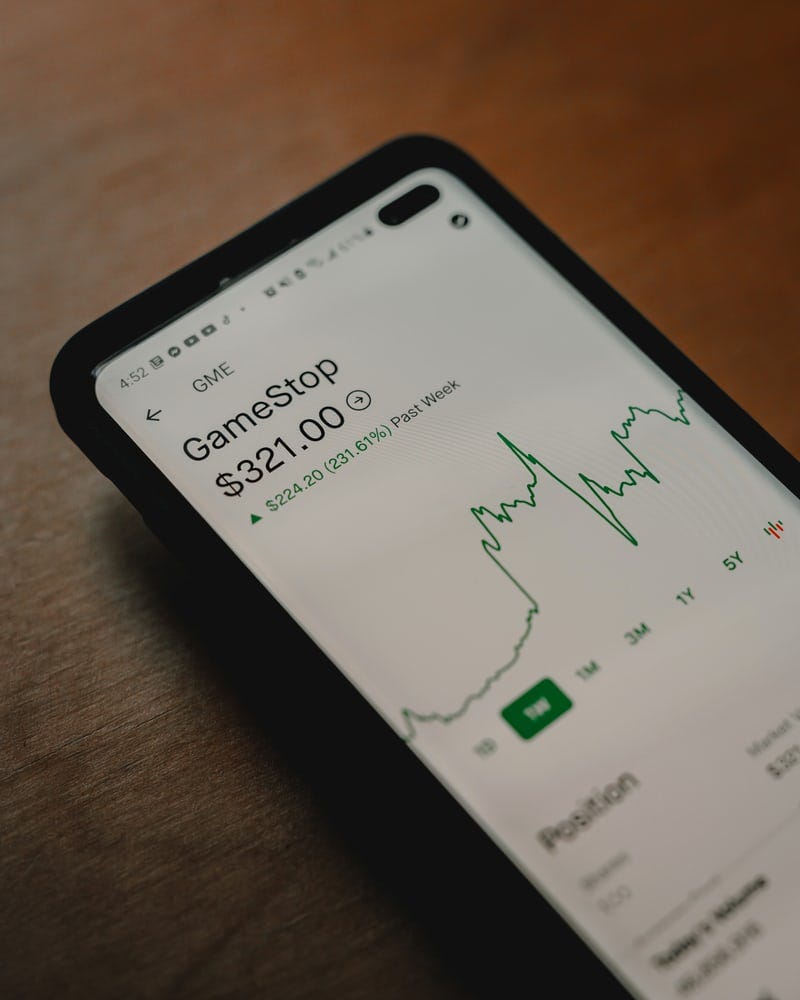Truth or Myth: To grow money you must have money to start with.
No doubt it’s easier but is it necessary?
Myth: Not at all! Not everyone has 6 grand to build a company or start investing in penny stocks.
Let’s do another one.
Truth or Myth: Your business will grow to as much as the amount invested.
Myth: Just because you put in $6k, doesn’t mean you’ll get that amount any faster or easier.
Especially if it’s a capital intensive business.
Investing is comprised of 3 things:
Emotions, Theory and Execution
In my experience, investing is 9% theory, 1% execution and 90% managing emotions. It’s not for quant nerds with the top Einstein IQ. It’s for anyone and especially for those that can handle fluctuations in life
This is through the philosophy of stoicism, which is known as patience. The way to manage investments is through emotion.
And if you’re already a good investor, you can use stoicism to become less emotionally tied to your profits and if you’re a beginner, you can finally reassure yourself and allow investing to be as easy as it made to be.
Investing is traditionally known to get everyday people to take part in profits of successful companies. With as little as $2, you can take part in a stock split (fractional shares of a stock) to earn some commission or earn dividends on stocks for little to no money invested upfront.
Just because 10% of the wealthiest investors own 80% of the profits since the beginning of time when the market was founded by predominantly male and institutional investors taking ownership, now every day people like average Joe and Jill are in fact swaying the market instead which isn’t so great either.
Investing should be based on fundamental analysis and reasoning. But with the rise of 0% commission free trading apps that Robinhood democratized and pledged, in particular, GenZers and Millennials are bored at home allured to making money, start gambling and having fun with the market while having no financial education to back up their trades.

Yet, is that all bad?
Yes, for their wallets, minds and sanity but it seems to be where we’re headed as an investment community. To bet against the hedge funds, big guys and corporations and rally up on social media to revolt and sway the markets.
This is what the Wall Street Journal stated. If they said it, we should be worried.
“Wall Street analysts and fund manager have always claimed to base their predictions on original research and fundamental analysis. Yet those have seldom been better than educated guesses. The result, over the decades has been billions of dollars in overcompensation for trillions of dollars in underperformance… Analysts, economists, strategists and portfolio managers still play the roles of clairvoyants, even though they are just guessing like the rest of us.”
So is fundamental analysis, spending hours researching and looking through 10ks, historical data, metrics, building DCFs and LBOs and balance sheets worth it anymore when logging on to social media is enough to know where to earn millions?
Compared to arguably the best investor of all time, Warren Buffet he still believes following the conventional route of research, planning and due-diligence are key because he enjoys it but for the every day investor that is just looking to earn income without spending a whole lot of time, then not necessarily and it seems to play out just fine in this low attention span social media world.
I wouldn’t recommend purely guessing your trades but if you know what a company does, believes it will be profitable, has a good reputation, doesn’t have billions in debt, nothing entirely new made out of thin air cough cough BitCoin and no real tangible value only made up, then invest in it! And to go the safer more intellectual route, simply invest in an index fund or ETF that monitors an index such as the S&P 500 to reap all the benefits of diversification, tax advantages and a healthy dose of risk.
That leads me to my first point on the key strategies to follow in order to go from 0 figures to 6.

#1: Get Your Mind Straight
When you become an investor, you have to be strategically stupid. Also known as KISS (Keep It Simple Stupid) to make the best trades and actually ‘win’. You are betting against your own foundations and want to make a nice hefty profit. Whether it’s in replace of your regular income in which case I commend you for quitting a job that robs your time and money puts it in Uncle Sam’s pockets or supplemental income on the side, investing shouldn’t be some skeptical, crazy thing. In fact, it has to be as boring as possible.
These are the top attitudes and ways of thinking I would like you to adopt to become the best investor possible:
-This isn’t Vegas or a casino. You’re investing in the future and believe companies will do well not poorly
-You’re not a hedge fund. You shouldn’t be running on leverage placing skeptical bets, no matter how young you are
-This isn’t a game. It should be boring, checked a few times a month not every minute of the dya like a day trader
-Invest in what you know and understand, not what others guess b/c you don’t kow their situation and reasoning
-Just because you’re young, doesn’t mean your risk tolerance needs to be aggressive. More risk = more reward yet more risk = more loss. Stick to your guts, you can always change but never get out once you’re in
-Get your emotions out of the picture. Don’t sell when you’re scared and buy when happy.
-Fundamental reasoning mixed with adventure. Don’t pick out of a hat but stick to your intuition. Analysis will only get you so far.

#2: Prioritize Wealth Building Accounts
Building wealth is easy if you want it to. Being a slave to your time at your job isn’t the best way to get rich especially since the more you make, the more you’ll be addicted to lifestyle inflation and having to give up a higher proportion of your income to the government through taxes.
While focusing on your job and other income streams, make sure your accounts are in check that house your money because the last thing you want to happen is have all that money vanish!
-Toxic debt/emergency fund
-Tax efficient accounts such as a Roth IRA, 529C
-Taxable brokerage accounts
-Payoff toxic debt (+4.5% APR)
-401K, 403B (up to employer match, ‘free money’)
-Max. Roth IRA/HSA/FSA
-Max 401K/403B
-Acorss low cost index funds (ETFs/Mutual Funds)
It’s much easier to grow if you aren’t stuck with debt, liabilities, loans, family repayments, etc. Make sure to have that in order before you focus on your investments to pay them back.

#3: Tax Efficient Accounts
Taxes are money down the drain, unless you enjoy supporting your country which in that case, let the mega cap companies do it for you. There’s no reason a middle class worker who is trying to support one’s family of 4 and putting food on the table should pay more income tax than Amazon who shelters their money in the Bahamas to pay 0 corporate tax.
It is a liability that the trillion dollar businesses should afford to pay.
Yet, until they actually do follow the rules which doesn’t seem to happen especially as they grow larger, it is our responsibility as American citizens to help Uncle Sam out and repay the budget deficit of now shy of 5 trillion.
The most tax efficient accounts to grow your wealth strategically and help pay off your debt once you start earning is through a Roth IRA or a Traditional IRA. Thinking about retirement and the future may be in the distant future, but that is the inherit problem for many!
We are scared about what’s going to happen because we cannot predict it. But the best thing you can do is design your own money making path to provide you a sturdy support cushion in case you ever need it.
Plan for the worst, hope for the best, especially since taxes take upwards of 30% of your income in some states.
These two accounts work wonders not just because they house your money and are tax efficient meaning you don’t pay tax after withdrawing the funds in a few years when taxes most likely will increase, they wrk with the law of compounding.
Compound interest means you earn interest on top of interest. It’s reinvested on top of the principle so the more you invest, the more you gain as a cheery on top.
Roth IRA:
-Pay taxes now, withdraw tax-free
-Contributions are made-after tax
-Contributions grow tax free
-Tax deductivibility: none
-Anyone with income is eligible-up to a certain income
-Penalty-free contirbtion withdrawal afer 5 Year Rule
Traditional IRA:
-Tax-break upfront, pay taxes on withdrawal
-Contributions may be pre-tax or after-tax
-Contributions grow tax-deferred
-Tax deductibility: may reduce taxes
-Anyone can contribute, age limitation may exist
Both:
-Annual contribution limits, limit increases at 50
-Mostly anyone with income can contribute
-May be used for medical, education and for home purchases, penalty-free
Take advantage of these as soon as you make income. In the long run, dependent on how much you invest, they could beat your salary, save you time and taxes.

#4: Taxable Brokerage Accounts
Along with taxable efficient accounts that keep and invest your money secure, here are the most strategic options for you to trade with that will actually invest and grow your money.
ETFs and Index Funds = Passive
Mutual Funds = Active
ETF:
-Usually passively managed
-Lower expense ratios (avg .15%)
-Low barrier to entry(min $50)
-Real time pricing. Bought and sold liek stocks
-More tax efficient, usually less capital gains
Mutual Funds:
-Usually actively managed
-hgiher expense ratio (avg. .67%)
-High barrier to entry (min $3k)
-Price doesnt’ change until end of trading day
-Activley amnaged, incur gains even without selling shares
Both:
-Built in diversification
-Baskets of stocks, bonds, commodities, etc.
-Can invest broadly or narrowly (sector, high-dividend, etc.)
-Managed by portfolio managers

#5: Seek Value Stocks
There are many competing investment theories about how to find the “best” investments based on your time frame, risk tolerance, and specific objectives. One approach, dating back at least to Benjamin Graham’s 1949 book, The Intelligent Investor, is to identify undervalued stocks that for one reason or another are selling at prices far below their underlying values.
Value stocks are hidden, usually the stocks that are unknown in the market that have been either trading for a while or are so low in price with barely any stagnant headline growth, that investors don’t pay attention to.
But more often than not, following the herd may not always be the smartest move because once a secret is out, not everyone can benefit.
Metrics to Follow to Find Value Stocks:
Low Price/Earnings Ratio
While a relatively low P/E ratio may indicate a buying opportunity, it’s important to remember there is likely a reason for the low P/E. Keep an eye out for this metric as it is a staple in finding growth opportunities.
Lagging relative price performance
If a company’s share price < industry peers, may reveal an underperformance situation.
Low price/earnings growth ratio (PEG)
This ratio is considered more accurate than just a company’s P/E alone. Growth projects are just projections yet if you look at a stock, take the P/E ratio and divide by the earnings growth rate, if the ratio is less than 1, investors will give it more weight to past performance than to further growth opportunities
High-Dividend Yield
If a company’s dividend payment rate > competitors, this may indicate that the share price has dipped to ‘undervalued status’.
Make sure to take note if the company isn’t in financial trouble and if the future dividend payment seems to be secure, the dividend opportunity can provide returns in the short term as well as the potential for the stock price to more higher in the future.
Free-Cash Flow
This is the amount of cash generated by the business after all expenses are accounted for. A stock that appears low-priced due to the lower reported earnings may be a great deal in terms of cash flow.

#6: Know the 101 on Income Taxes
Sold a stock? Get ready for taxes.
There are 2 types of capital gains tax you must pay if you sell or bought a stock:
Short-Term Cpaital Gains:
If you bought and sold a stock in less than a year, you pay the normal tax rate for your income.
For example:
You pay 12% if your income is $9k-$40k
Pay 22% if income $40–85k
Pay 25% if income $85k-$163k
Long-Term Capital Gains:
(*More strategic since you pay less over the long term, not based on income*)
Pay 0% if income < $53k
Pay 15% if income $53k-$469k
Understanding how a company makes money along with how taxes work in the stock market are crucial to developing a tax efficient money making plan.

Key Things to Check About A Company:
-Understandable
-Good track record
-Expect future cash flow/profits
-Dividend or growth stock
-Reputable
-Investment making an impact and you agree with the way it’s moving the world forward

Summing It All Up
To accomplish your goals, addressing your savings, budget, debt, emergency fund, expenses and income streams are critical first steps to get the ground running. Without this foundation, it will be much more difficult for you to get started investing because you’ll be taking on too much risk, leverage in expense for paying for capital gains tax if you need to sell in case there’s an emergency and have not enough cash.
Once those are set in stone, begin doubling down on what works.
Since saving is easier than making money, focus on budgeting. If you have a side hustle that you can accelerate, focus your attention on that in order to get rid of any toxic debt including car, luxury loans first and then pay back good debt: student loans and business payment if they’re still accumulating interest.
From there after stabilizing your toxic debt by using balance transfers and focusing on savings, increase you emergency fund. Build a 6–12 month cash cushion in a high yield account so you can accumulate interest as much as possible besides in a savings account earning only a few dollars per year.
Lastly, prioritizing wealth building and brokerage accounts are key to investing. Tax efficient accounts are a must since they eat up a lot of your income already, so being strategic with investing and other capital or intellectual property such as videos or real estate will help alleviate the tax burden. Expenses can be deducted from your estates and business(es) but not your job.
Net worth milestones from $1 to $1M don’t have to take a whole lifetime to achieve.
-Pay off Toxic Debt
-Emergency fund
-Budget
-Tax efficient accounts
-High performing lost cost index funds
-Pick a brokerage or Robo advisor
-Crisis management plan: cash = king
And you’re ahead of 80% of the population already.

